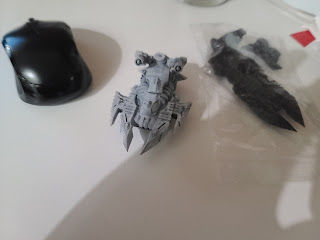The 3D printer in question is an Ender 3 owned by my brother. I've ordered 3D printed models before, but had never actually seen any printed and I wasn't really familiar with the details and practicalities of how it works. It turned out to be quite simple.
The subjects we were printing were the Croft range from DRS - very Eldar-esque grav-tanks. Like most of DRS's ranges the basic vehicle is available in a number of variants, from troop transports, to tanks, to AA. My brother set it up for me and here are the first couple we printed (both the AA variant);
The raw material this printer works with comes as a spool of plastic filament 1.75mm thick. The printer can be set up to get the file by directly connecting to a PC, or (as in this case) loading it onto an SD memory card. It took around 4-5 hours to print each of these vehicles. Which for reference are around 6cm / 2.5inches long, and use 50g of plastic.
So yeah, definite fan and convert to 3D printing, and I can see myself using this more in future.
One comment I will make is that 3D printing is potentially a very economically disruptive technology. These models for instance, DRS sells complete printed minis for £16, which is about the norm for 15mm vehicles. However they also sell the .stl template to print them for only £8 (this includes all the variants), and it takes only around £1 worth of plastic to print each vehicle. I'm planning on producing around 10-14 of these things to form a company sized unit, so rather than £160-200 it's only going to cost me around £20 (of which DRS only gets £8). Obviously that won't justify DRS's time and effort in creating the .stl file, so it's not a sustainable business model.



No comments:
Post a Comment